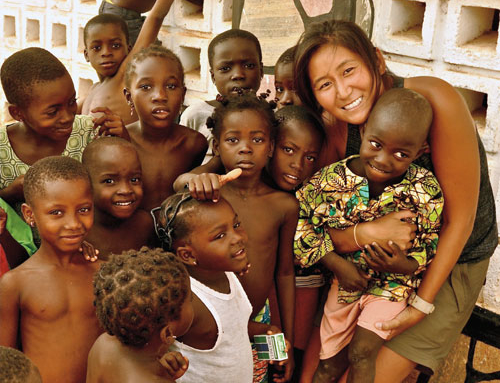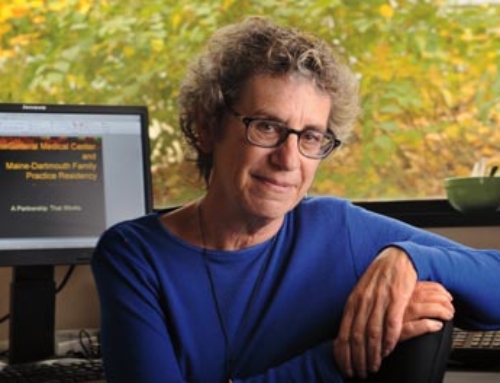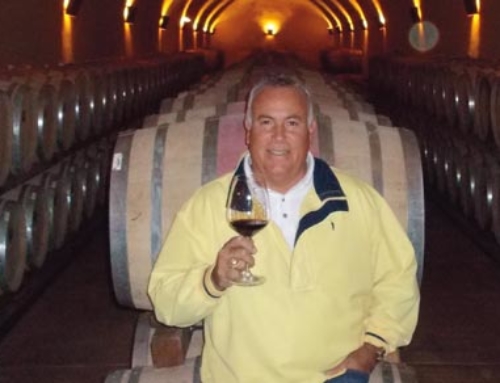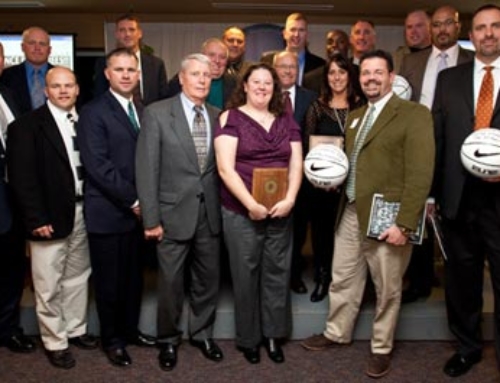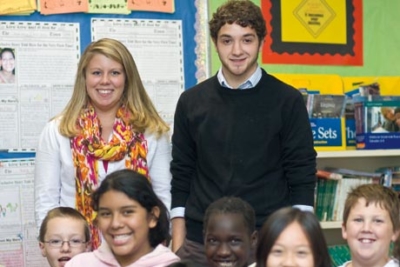 At Saint Joseph’s College, the community is an extension of the classroom, thanks to innovative courses that incorporate service learning.
At Saint Joseph’s College, the community is an extension of the classroom, thanks to innovative courses that incorporate service learning.
Service learning gives students a chance to apply what they’ve learned to real-world settings, making them more active participants in their education. In the Mercy spirit of service, the students share their skills at a community or non-profit organization, but as they’re giving to others, they’re getting something tangible back.
“It’s above and beyond community service, above and beyond a volunteering experience. It’s more experiential learning,” says Kimberly Post Rowe, M.Ed., service learning coordinator. “It gives students a real-world experience. It gets them involved in their communities. It keeps them from being isolated.”
Last spring, 40 courses ranging from science to sociology had service learning components, with more than 400 students participating. They worked with local partner organizations including the Frannie Peabody Center, Raymond Elementary School, Standish Recreation, Portland Housing Authority, and the Portland Children’s Museum and Theater.
Rowe’s task is to find the right course-community connection. “I look for something that is really going to be rigorous, that is going to be challenging, that is going to stretch the student beyond where they would normally go,” she says.
For instance, fine arts major YuPing Hu helped design the set for the Children’s Museum and Theatre of Maine’s production of “Sleeping Beauty,” which ran from October 19th to October 28th. Hu enjoys service learning because, she says, “I meet many different people and learn to step outside of my own box. I might be contributing to the community through my art, but in return, the community gives back compliments and suggestions that allow me to grow as an artist.”
Laura Merrill, an elementary education major, went to Riverton Park in Portland to help immigrant students with their homework. “It ranged from math to history to chemistry to writing English papers,” she says.
The Portland Housing Authority has three drop-in education centers aimed primarily at students between ages 8 and 18. According to Emily Fitch, the Housing Authority’s youth services coordinator, each center serves up to 60 students a day.
“We have two staff members at each site. Two people trying to help 60 kids over the course of four hours, it’s impossible,” she says. “We really rely on educated volunteers who come in to support these kids, to get to know them, to show them they can actually succeed in school.
Fitch says 18 percent of their volunteers come from Saint Joseph’s College. “We greatly appreciate all our community partnerships that really make our programs possible,” she says. “It’s worked out very well for us.”
Merrill would say the same. She says working there helped her learn how to overcome language barriers while teaching. Although not always easy, she says it has been rewarding.
“You definitely felt a bond with the kids there. They knew you. They expected you. They wanted you to come,” she says. “There was definitely enthusiasm from them and that in turn made me excited.”
Thomas Smith, a criminal justice major, feels similarly about his experiences. Smith worked both at Catherine’s Cupboard in Standish (for a theology course) and at the Mission Possible Teen Center in Westbrook (for an American Criminal Justice Systems class). At the food pantry, he packed and carried boxes of food. Through the experience, he says he became more aware of just how difficult it is for people to ask for help.
“People are really kind of humbling themselves by coming to Catherine’s Cupboard. A lot of them don’t make eye contact or don’t talk,” he says. “But all the staff I work with say that it’s okay to ask for help. That’s what I took from that.”
At the teen center, Smith spent hours playing video games, pool, ping-pong, and doing other activities with youth after they got out of school.
“A lot of the kids are just kind of caught on the streets and have gotten into bad situations because of it,” he says. “My job consisted of making these kids realize that the teen center is a more desirable alternative than hanging out on the street.”
Smith says his experience at the center led him to reevaluate his career path. “I went into criminal justice saying I want to be a state cop or a federal agent or something, but now I realize I wouldn’t work with people if I did those high-powered jobs. If I become more of a city police officer, it would be more like social work; I would be working with people.”
An important element of service learning is the required reflections, which might take the form of journal entries, online discussion boards, or class presentations.
“The reflection piece is huge because, more and more, we are losing our reflective capabilities. I’m generalizing, but students don’t often take the time to be still and to think about things and to think deeply,” says Rowe. “I think service learning has the potential to really encourage critical thinking skills, and self reflection, and metacognition, thinking outside the box. They have to solve problems.”
“What I like about it is that you can take what you’re learning in the classroom, apply it, and then go back to your professor and say this was working, this wasn’t working. Where do I go from here?” says Merrill.
Dr. Janice Rey, an education professor, has organized a service learning project with the Portland Water District, sending her students to teach hands-on lessons about water to Portland Housing Authority resident afterschool students. “It is a teaching and learning strategy that unites partners in a reciprocal purpose,” she says.
Both Smith and Merrill believe service learning has better positioned them for their post-college years.
“I think it definitely puts you in the real world sooner,” says Merrill. “You don’t have to wait until your senior year to figure out that’s not what you want to do or that is what you want to do.”
“I think a lot of people view college as that bubble where they’re going to teach you how to go out into the world and be productive, but I’ve seen too many students who go from college and become completely lost,” adds Smith. “But when we’re out at service learning, we’re out in the world doing something.”
The Portland Housing Authority is looking for more volunteers at its education centers. If you’re interested in learning more, contact Emily Fitch at 207-773-4753.
by Charmaine Daniels
